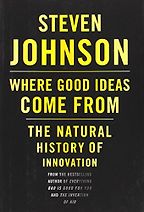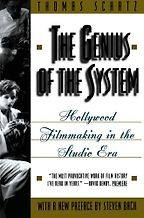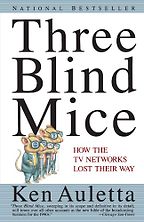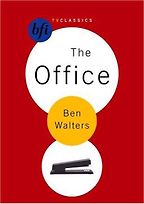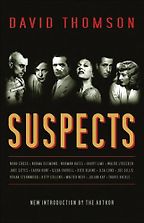The inspiration behind this interview is the book by Steven Johnson, Where Good Ideas Come From. You gave a wonderful speech last year tying the ideas in that book to your own career, especially your decision to back the hit series The Office when you were head of BBC2. Do you want to summarise what’s so great about the book?
What’s really interesting about Steven’s book is that he’s not primarily a television or even a media person. He looks at where Darwin got the idea for evolution or where Tim Berners Lee got the idea for the internet, or Willis Carrier got the idea for air conditioning. He has these common threads that he thinks are there in almost all great ideas. And they’re quite different to what you think of. The normal stereotype of an idea is that it’s a light bulb that goes off in somebody’s head. There’s this ‘eureka!’ moment and a fully formed idea emerges. What he points out is that that is very, very rarely the case. Most ideas are a little idea that you nurture over a long period of time. He calls it a ‘slow hunch’. Sometimes it’s just half an idea but then, by being in a climate which nurtures ideas, you find something else that matches with your half idea and creates a whole idea. He’s beautiful on Tim Berners Lee, who created the World Wide Web partly as a way to keep track of his own data. But he’s working at the CERN institute in Switzerland, and they give him time to play around with his organisational system. Then, finally, after about ten years, and much iteration, he comes up with something that transforms the whole world.
You can apply a lot of these things to great ideas in television. Mostly it is a slow hunch that develops over a long period of time and then finds a fertile resting ground, where it has a chance to grow and spread its wings and develop into something amazing.
So is there a great deal of chance involved in whether or not you do actually find that fertile resting ground?
I would say more a great deal of sticking with something, and not giving up on something, even though it seems like an unproductive route to go down. Anybody around ideas has to recognise that there will be many, many blind alleys before you get to the right route.
And he emphasises the importance of making mistakes, doesn’t he?
Yes, absolutely. Errors that you learn from, things where you think, ‘No that wasn’t right,’ and you develop a way of understanding what was right and what was wrong.
In your speech, it was incredibly moving but I also found it interesting that you came up with one really good idea, for the hugely popular Greatest Britons series, when your mum was in hospital. And I wondered whether there is something about being in those awful situations that enables us to forget all the fluff and tap into something universal…
There is something about really not thinking. In almost any industry, we’re always looking at demographics, at analysing the competition, understanding them and responding to them. But often, the best things come out of people just looking at themselves. Thinking, ‘What’s really interesting?’ ‘What interests me?’ Or looking at people around them. That’s where those persistent sparks can lead to something extraordinary.
Tell me about your next book, The Genius of the System by Thomas Schatz – about Hollywood in the golden age.
This is an amazing book. It’s an academic book, but it reads like a novel. It was a very important book for me when I was studying film and television. Film theory was dominated for many years by the idea of the auteur, the single visionary director who managed, in the hell of the industrial system that was Hollywood’s studio system, to nonetheless produce amazing individual work. Thomas Schatz’s book is a complete antidote to that. While he doesn’t in any way argue that Alfred Hitchcock or John Ford weren’t great directors, he talks about the vigour and energy of the classical Hollywood system. It’s not about these maverick individuals succeeding by fighting against the system.
Rather, it’s the system that made them who they were…
Hence the book’s title. It’s the push-and-pull of an industrial money-making system that is also a creative system at the same time. And I think that is one of the essences of television now. On the one hand, it’s a money-making machine, so there are a lot of people out there who really just badly want to make a lot of money. Since a lot of things involved in making television and movies are unbelievably expensive – you won’t be able to make a multimillion-dollar movie, or television series with computer graphics, just because you have a good idea – there is always this intersection between money and creativity. The two of them are intimately connected. Schatz’s book goes through the real detail of how it worked, how people made movies like Gone with the Wind, or Warner Brothers crime films, or film noir.
I was just looking at it this morning, actually, and there’s a list of ‘Ten Commandments for Studio Readers’ from Thalberg, who ran MGM’s story department for a long time. Number one is, ‘Your most important duty is to find great ideas – you’ll find them buried under tons of mediocre suggestions.’ Another one is, ‘See at least two full-length motion pictures each week.’ Also, ‘Train yourself to recognise sincerity in a story.’ They’re almost exactly the same things that you’d say to a development researcher in a TV company now. I thought it was astounding that so long ago the rules about how to create good ideas were almost the same.
Shall we move on to Three Blind Mice, by Ken Auletta?
This is another book where you can recognise that intersection between creativity and industry. It’s about a system that starts off with the amazing golden days of the big three TV networks, emphasising particularly Brandon Tartikoff’s time at NBC, which involved in the creation of Miami Vice, LA Law, The Golden Girls, Hill Street Blues – an incredible range of amazing projects. But it’s a story of decline. The Three Blind Mice are the three main networks who lose this incredible position that they have at the centre of American and global entertainment. They don’t notice all the changes that are going on around them – from the growth of VHS, to the beginnings of the cable networks, to the things that will lead them to the incredibly diminished position that they have now. He details the corporate battles that go on when outside industrialists come in and attempt to change the system. It ends up, eventually, with nobody really focusing on what is going on outside the firm, no one really understanding how much the world is changing. It’s a brilliantly written book, which is also a great cautionary tale. Even Tartikoff gets it completely wrong with some series. It’s that sense of error, of people who are geniuses committing themselves passionately to things that are just wrong, that people hate. And then picking themselves up and carrying on.
Does he see these industrialists coming in as a bad thing?
He sees it as inevitable, because there is so much money locked up inside these organisations. Some are good and some are bad. He talks about Jack Welch, when GE buys NBC, standing back and letting them get on with it in lots of ways. Other people are much more destructive: take, for example, the Larry Tisch era at CBS, when the organisation really lost its way. They all become conservative and defensive. That’s the other big thing. Arguably they should have embraced the changes that were going on all around them, but instead they hid from them, and decided not to invest.
What’s your outlook for the networks now – are they still in big trouble?
A lot of the energy in production has moved, first of all, to the cable networks, and, even beyond that, to things like YouTube. There used to be these three ivory towers that were almost impossible to get into. At the heart of them sometimes people did amazing work, but they weren’t porous to the world outside. Now we live in a world of amazing porous-ness. Even over the period that I’ve worked in television, it’s gone from being a very narrow world to being a world that people move in and out of all the time. The major networks will never regain the power and influence they once had in the world, when they were the only three places where people could watch anything.
But you don’t predict their imminent demise?
No. I think they go through phases of great creativity. Look at American Idol and Lost. Some of these projects that were definitely different and surprising happened. Or even now, with shows like Glee. But the bar for the networks to invest in dangerous projects is very high. It’s much easier for smaller entities like HBO or AMC or even the History Channel to invest in surprising projects, and find that little trigger that somehow connects up with what everybody needs.
Get the weekly Five Books newsletter
You also wanted to mention an article in Vanity Fair about
The Simpsons.
It’s interesting to look at the individual stories of how things are created. This article goes through some of the story behind the creation of The Simpsons. They don’t end up interviewing the two fundamental creators of The Simpsons, Matt Groening and James Brooks, but they do have Rupert Murdoch and Fox CEO Barry Diller telling their part of the story. No one quite knows the truth, but something that might just have been pitched in a meeting without Matt Groening having really thought about it before, because of the way things were at Fox, just becomes huge and connects with audiences in a way that people never expected it to…
You’ve also got Ben Walters’s book about The Office.
This book tells the story of how something with the most unlikely origins, something that started off with a tiny little mini-pilot made by the BBC, became something that is now in, I think, its eighth season in America, with different versions in India, Latin America, Japan, and all around the world. There were two really big, good ideas in the creation of The Office. The first was Stephen [Merchant] and Ricky [Gervais]’s original idea to examine incompetent bosses’ cooptation of management-speak, and the ridicule this subjects them to at the hands of their employees. Then there was the BBC’s decision to allow the guys who thought of this to direct it themselves; that was the second good idea. They had directed only one five-minute film in the past, but they were given a prime-time TV series to direct on their own. Their idea had found a soft landing place in the BBC’s comedy department.
And do you think that that was due to some peculiarity of BBC2? Would The Office not have happened if this had been an American network?
It was BBC2’s job to find new comedy. We had a very high tolerance for things that didn’t immediately stick, but that we thought were great. When we were proud of them, we were able to really promote them to a huge audience – that’s one of the wonders of the BBC’s position: it’s a soft landing place for new ideas. The Office took the whole of the first series to gain an audience. Whether in another system it would have been given a second series, given that the audience really did struggle with it the first time, I don’t know. That is the wonder of the BBC. In the American system, things have to gain traction very quickly for them to continue – if the audience figures are terrible, the financial imperative means the broadcaster just has to bail.
On the other hand, one of the other things that Steven Johnson talks about in his book is the adjacent possible. The Office started at exactly the moment when people were starting to use computers at work – not only to work, but also to send messages and have fun. The Office became, for obvious reasons, the bored office worker’s weapon of choice against people they worked for whom they didn’t necessarily appreciate. I remember my husband coming home and telling me how in his office he’d seen little jpegs of David Brent being passed around by the assistants with the message, ‘Remind you of anybody?’ And I thought, ‘Yes! This means it’s going to work.’ Five years before, it probably wouldn’t have happened.
Your last choice is Suspects, by David Thomson.
This is a novel. Well sort of a novel. Somewhere between a novel and a film history book. David Thomson is a very eminent historian of film and his Biographical Dictionary of Film is one of those vast seminal texts everyone knows about in film studies. But this is a novel and what’s really important about it is that it allows you, the reader, to finish the story of people in big films and find the connections between them. It’s written as a series of short biographical sketches of fictional characters as though they were real. So, for example, you find out that Norma Desmond in Sunset Boulevard is the mother of Julian Kaye, the American Gigolo. You get this connection between the two films. It’s completely right and brilliant. He has a chilling end to the story of what happens to the Diane Keaton character in The Godfather. Whenever I see The Godfather on rerun now, I always think of that after-the-end-of-the-film story that he includes.
What I really like about the book is that it gives you a sense of how the audience can finish off the story for themselves. It’s not what the people who were making it thought, it’s about what a movie or piece of television means to the audience too – the people who take it up, and makes it into their special thing. You can see this in people passing clips of David Brent around the office, you can see it in the way Lost became a huge talking point on the internet, the whole phenomenon of people creating parodies of things, and connecting them up to their own world. It relates to some pretty complex film and television theory about how you really have to understand the totality of any kind of creative work. David Thomson’s book is just a perfect illustration of that. I’ve lost count of how many copies of it I’ve given to people over the years.
March 7, 2011. Updated: April 29, 2021
Five Books aims to keep its book recommendations and interviews up to date. If you are the interviewee and would like to update your choice of books (or even just what you say about them) please email us at [email protected]
Five Books interviews are expensive to produce. If you've enjoyed this interview, please support us by donating a small amount.
